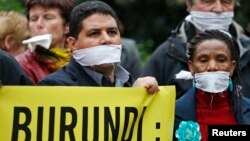BUJUMBURA —
Burundi's president has approved a media law that forces journalists to reveal sources and forbids stories deemed to undermine national security, drawing condemnation from reporters and rights groups on Tuesday.
Journalists said they would ignore the legislation and challenge it in the constitutional court.
Reporters Without Borders said the law, which had been endorsed by parliament and the senate before President Pierre Nkurunziza signed it, set the east African country back 20 years.
“This is a black day for freedom of information in Burundi,” the campaign group said in a statement.
A spokesman for the president, Leonidas Hatungimana, said the legislation took effect immediately but made no further comment.
The bill bans the media from publishing stories about national defense, public safety, state security and the local currency.
Those who break the law face fines of between $2,000 and$6,000, a sum well above the annual salaries of many journalists.
Nkurunziza, a former rebel leader, won a second term in 2010 in a vote boycotted by the opposition.
Journalists said they would ignore the legislation and challenge it in the constitutional court.
Reporters Without Borders said the law, which had been endorsed by parliament and the senate before President Pierre Nkurunziza signed it, set the east African country back 20 years.
“This is a black day for freedom of information in Burundi,” the campaign group said in a statement.
A spokesman for the president, Leonidas Hatungimana, said the legislation took effect immediately but made no further comment.
The bill bans the media from publishing stories about national defense, public safety, state security and the local currency.
Those who break the law face fines of between $2,000 and$6,000, a sum well above the annual salaries of many journalists.
Nkurunziza, a former rebel leader, won a second term in 2010 in a vote boycotted by the opposition.











